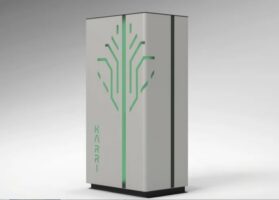A new Victoria government-backed study will examine how solar panels could be used to protect fruit orchards and other food crops from extreme heat events, potentially broadening their on-farm uses and getting around concerns that heat from solar panels could damage crops.
The Horticulture Solar Energy program, launched on Monday, will be led by Agriculture Victoria scientists at the Tatura SmartFarm in the Goulburn Valley, the state’s fruit-growing centre.
Tatura, alongside the Midlura SmartFarm, is a government-backed horticulture research facility that aims to increase yield, product value and production efficiency in pears, apples, stonefruit and almonds.
Tutura SmatrtFarm is also home to the world’s first sundial orchard – a multi-directional experimental orchard covered designed to help researchers understand how design impacts production efficiencies, labour efficiencies, climate resilience, and fruit yield and quality.
The solar study, which has received $30 million in funding from Andrews Labor government’s Agriculture Energy Investment Plan, will install PV panels above a pear orchard, providing both cheap energy and potentially crop-saving solar shade.
It comes roughly four years after an article published in the science journal Nature reported that solar farms acted as heat banks, raising surrounding temperatures by 3-4C°.
As RenewEconomy sister site One Step Off The Grid has reported, this study caught the attention of some Australian farmers in 2017, including fruit growers in the Goulburn Valley, concerned about the impact several solar farms proposed for the region would have on their businesses.
A December 2017 report in the local Weekly Times said some farmers in the Valley had grown concerned that large banks of solar panels would act as “massive heat sinks” and spoil their crops.
Other Goulburn Valley fruit growers have embraced solar, however, with one business in the region cutting its grid power consumption by one-third, and its annual electricity costs by $62,000 a year, after installing 200kW of solar across the rooftops of its storage sheds.
As One Step reported, the two 100kW solar PV systems were installed at the Central Park Orchards and Mountain Valley Produce Centre of the Rachele Group – a third generation pear and stone fruit farming family business, to manage its costs.
“We pick our fruit and then we have to pull it down to zero degrees immediately,” explained business co-owner Matthew Rachele. “This refrigeration takes a lot of energy, it’s the most energy intensive part of our operations.”
In comments this week, state agriculture minister Mary-Anne Thomas said the Tatura SmartFarm study was an important way for Victorian scientists to develop practical solutions to some of agriculture’s biggest problems.
“Farmers and producers experience the impacts of climate change firsthand – it’s vital that we help them adapt so they can continue to get our world-class produce to markets across Australia and the world,” she said.







